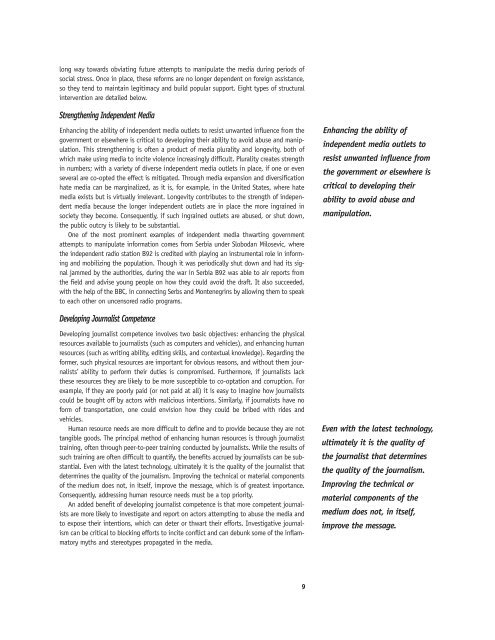Institutional Racism
Institutional Racism
Institutional Racism
You also want an ePaper? Increase the reach of your titles
YUMPU automatically turns print PDFs into web optimized ePapers that Google loves.
long way towards obviating future attempts to manipulate the media during periods of<br />
social stress. Once in place, these reforms are no longer dependent on foreign assistance,<br />
so they tend to maintain legitimacy and build popular support. Eight types of structural<br />
intervention are detailed below.<br />
Strengthening Independent Media<br />
Enhancing the ability of independent media outlets to resist unwanted influence from the<br />
government or elsewhere is critical to developing their ability to avoid abuse and manipulation.<br />
This strengthening is often a product of media plurality and longevity, both of<br />
which make using media to incite violence increasingly difficult. Plurality creates strength<br />
in numbers; with a variety of diverse independent media outlets in place, if one or even<br />
several are co-opted the effect is mitigated. Through media expansion and diversification<br />
hate media can be marginalized, as it is, for example, in the United States, where hate<br />
media exists but is virtually irrelevant. Longevity contributes to the strength of independent<br />
media because the longer independent outlets are in place the more ingrained in<br />
society they become. Consequently, if such ingrained outlets are abused, or shut down,<br />
the public outcry is likely to be substantial.<br />
One of the most prominent examples of independent media thwarting government<br />
attempts to manipulate information comes from Serbia under Slobodan Milosevic, where<br />
the independent radio station B92 is credited with playing an instrumental role in informing<br />
and mobilizing the population. Though it was periodically shut down and had its signal<br />
jammed by the authorities, during the war in Serbia B92 was able to air reports from<br />
the field and advise young people on how they could avoid the draft. It also succeeded,<br />
with the help of the BBC, in connecting Serbs and Montenegrins by allowing them to speak<br />
to each other on uncensored radio programs.<br />
Enhancing the ability of<br />
independent media outlets to<br />
resist unwanted influence from<br />
the government or elsewhere is<br />
critical to developing their<br />
ability to avoid abuse and<br />
manipulation.<br />
Developing Journalist Competence<br />
Developing journalist competence involves two basic objectives: enhancing the physical<br />
resources available to journalists (such as computers and vehicles), and enhancing human<br />
resources (such as writing ability, editing skills, and contextual knowledge). Regarding the<br />
former, such physical resources are important for obvious reasons, and without them journalists’<br />
ability to perform their duties is compromised. Furthermore, if journalists lack<br />
these resources they are likely to be more susceptible to co-optation and corruption. For<br />
example, if they are poorly paid (or not paid at all) it is easy to imagine how journalists<br />
could be bought off by actors with malicious intentions. Similarly, if journalists have no<br />
form of transportation, one could envision how they could be bribed with rides and<br />
vehicles.<br />
Human resource needs are more difficult to define and to provide because they are not<br />
tangible goods. The principal method of enhancing human resources is through journalist<br />
training, often through peer-to-peer training conducted by journalists. While the results of<br />
such training are often difficult to quantify, the benefits accrued by journalists can be substantial.<br />
Even with the latest technology, ultimately it is the quality of the journalist that<br />
determines the quality of the journalism. Improving the technical or material components<br />
of the medium does not, in itself, improve the message, which is of greatest importance.<br />
Consequently, addressing human resource needs must be a top priority.<br />
An added benefit of developing journalist competence is that more competent journalists<br />
are more likely to investigate and report on actors attempting to abuse the media and<br />
to expose their intentions, which can deter or thwart their efforts. Investigative journalism<br />
can be critical to blocking efforts to incite conflict and can debunk some of the inflammatory<br />
myths and stereotypes propagated in the media.<br />
Even with the latest technology,<br />
ultimately it is the quality of<br />
the journalist that determines<br />
the quality of the journalism.<br />
Improving the technical or<br />
material components of the<br />
medium does not, in itself,<br />
improve the message.<br />
9

















